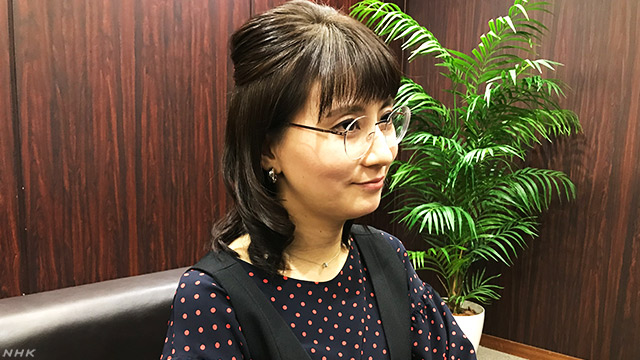Controversy online
The topic has prompted vigorous discussions online. Many protested the rules on social media postings. Here are some reactions:
"It's unbelievable there are workplaces with such a rule."
"It's discrimination against women."
"I have no choice but to quit if I'm barred from wearing glasses at work."
"There are people who can't wear contact lenses, and they're also expensive. Will the company pay for them?"
But some expressed understanding, saying that there may be workplaces where it may be preferable for women to not wear glasses.
Women in various lines of work, including receptionists, beauty therapists, waitresses and childcare workers, have complained on social networking sites that they were banned from wearing glasses at work.
As to why, a beauty therapist was told that "glasses are dangerous because they could fall on customers." But some reasons were far from convincing. One receptionist was told that "women wearing glasses look cold," while a worker at a massage salon was warned that they "create a gloomy atmosphere."
Women expected to abide by the rule
We met with a woman who had to quit her part-time job because of a glasses ban.
The 20 year old has been wearing glasses since elementary school. She decided to take a part-time job at a Japanese restaurant last year when she graduated from high school.
She wore glasses to the interview. The interviewer, a male manager with glasses, made no mention about her eyewear.

But later on, when she went to the office to practice how to put on kimono, the uniform for waitresses, a female superior told her that waitresses were not allowed to wear glasses at the restaurant. The superior said the ban was in place because "glasses get fogged up when serving hot, steaming food," and "glasses don't go well with kimono."

The woman was able to accept the first reason. But she was not convinced about the second one. She asked the superior why male managers are allowed to wear glasses but not her. The superior replied, "it's not a problem with men who wear suits." The woman pointed out that if the ban only applied to women, it wouldn't stop male staff from appearing in front of customers with fogged up glasses. The superior responded angrily that it was taken for granted that women never wore glasses when clad in kimono.
The woman is allergic to contact lenses. She had no choice but to quit her job. She says, "It was a very shocking experience. I don't find 'glasses don't go well with kimono' a convincing-enough reason. Also, I was sad that a female manager was adhering to the glasses ban targeting women."
How flight attendants are affected
Many online posts suggest that flight attendants are also banned from wearing glasses. In Japan, the job is often considered to be for women.
We asked Japan's leading carriers, Japan Airlines and All Nippon Airways, whether they ban glasses.

Both companies said flight attendants, both male and female, are banned from wearing glasses at work.
We asked why, and they responded that it was for safety reasons as glasses could fall and break during emergencies, obstructing the evacuation of passengers and other operations.
TV anchors and glasses
Here at NHK, many male announcers wear glasses, but we seldom see female announcers with them. We checked the images of our colleagues on the NHK website and found that none of the female announcers wore glasses.
Could there be a rule banning women from wearing glasses? We asked the announcers' department.

Asahi Inoue is the anchor of one of NHK's news programs. She checked the rules for us, and said there was no ban on glasses.
Inoue usually wears glasses, but not on air. She said she wears contact lenses in the studio because glasses make her face appear distorted and may change the impression viewers have of her. She said she wants viewers to remember her face without glasses, but this has nothing to do with the fact that she is a woman.

We asked her what she thinks of the arguments concerning glasses bans.
She referred to the #KuToo movement in which women protested to being forced to wear high heels. She said it's important for people to question the validity of workplace rules and discuss them. Some may want to avoid arguments, but a workplace where people can dress comfortably and feel positive would be beneficial for everyone.
Glasses reveal personality
Sabae City in Fukui Prefecture, central Japan, produces over 90 percent of glasses frames sold in the country. But the residents here don't associate glasses with gloominess or coldness.
An official at the city's secretary and PR office said, "Companies must have their reasons for banning glasses. But it's strange that these bans only apply to women. Glasses can show the wearer's personality."

The official also said that the view that glasses don’t go well with kimono is not true.
The city gives each resident who reaches adulthood a pair of glasses partly to encourage them to respect their individuality. The city chooses pairs that go well with kimono for women who take part in a coming-of-age ceremony in the city.

The official said, "There may be biased views and long-standing stigmas. But glasses are now a fashion item and many people wear different pairs of glasses on different occasions."
An unconscious bias?
Sook Ja Park, a diversity consultant , says an unconscious gender bias is at play with the glasses bans.
Unconscious biases are stereotypical views that one forms unconsciously based on the environment and experiences.
Park says that it's discrimination when women are not allowed to do something that men are permitted to do.
"Women are judged by their appearance because of notions such as 'women should be pretty' or ' looking good is the first step to success.' These values are deep rooted in Japanese society so much so that many women don't even acknowledge the bias and take such an attitude for granted. Starting discussions would create a movement and bring such unconscious biases to people's attention. That could bring about change to society, which I believe is important."



